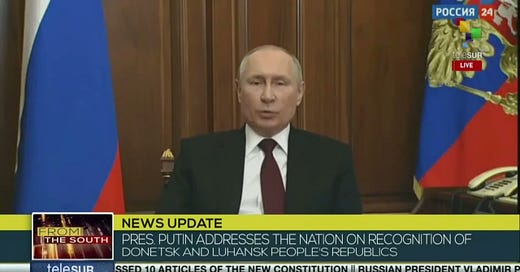There is a fundamental difference in perspective between the mainstream media, owned by the great corporations of the North, and the media of the global South, developed by states that are seeking to develop an alternative world-system. With respect to Russia and Ukraine, the difference is as follows. The mainstream media: Russia has launched an invasion of the sovereign nation of Ukraine, reflecting the authoritarian personality of Putin, thereby renewing the Cold War. The media of the global South: Russia has undertaken a military action, with the intention of dismantling the Ukrainian military infrastructure, in the Russian-majority republics of Donetsk and Lugansk, recently recognized as independent by Russia, in response to the sustained military attacks of the ultra-nationalist government of Ukraine, which usurped power eight years ago; and in response to the expansion of NATO to the East, in violation of previous promises by the Western powers to Russia.
My sou…


